3sat, 9.05 pm
Quinten cannot be reached by car. Only on foot. Or via Lake Walen. The former tunnel builder Hampi Cadenau has created a little paradise for himself with his vineyard above Quinten. Now the owner of his leased land wants to put the property up for sale.
Phoenix, 6.00 a.m.
The Saar is not even 250 kilometres long. But hardly any other river in Europe connects so many different motifs and landscapes on its banks over so few kilometres. The Saar is home to winemaker Christian Ebert. Industrial use and ecological viticulture: a contradiction in many places, not so on the Saar. Even steep slope expert Ebert has nothing against the cargo ships chugging along in front of his vineyards, on the contrary: the development into a major shipping route ensures an evenly wide expanse of water. This moderates the temperatures in winter. For the winegrowers, this is a blessing, as their wines are less susceptible to frost and have a more pleasant acidity since the canalisation.
Phoenix, 6.45 a.m.
The film team meets an 80-year-old ferryman who ferries his few guests in a decrepit wooden barge for fifty cents; a real princess who has taken over the family business on the steepest vineyard on the Main after a hard stroke of fate; and one of Germany's youngest female sailing pilots who is already doing her rounds high above the Main at the age of 14.
SWR Television, 11.15 a.m.
WDR Television, 1.05 p.m.
Mushrooms are omnipresent and essential for life on earth. Without mushrooms, the world would suffocate! Fungi recycle the waste of ecosystems. In forests, they decompose dead organic material, thus providing trees and plants with nutrients, minerals and water again and again. In return, they receive energy in the form of sugar. Many fungi live in symbiosis, not only with plants, but also with animals, to mutual advantage. Fungi have a lot to offer. We humans also benefit from them - without mushrooms, no bread, no beer, no wine!
ANIXE, 5.50 p.m.
Falk-Willy Wild can see for himself on his trip that the Cypriot wines are of quite outstanding quality. No wonder, because wine has been cultivated in Cyprus for thousands of years. An art that is also cultivated in the island's monasteries.
3sat, 5.30 a.m.
More than 1000 cellar alleys are among the defining cultural assets of Lower Austria. In the past, grapes were pressed and wine stored there. Today, modern production facilities and warehouses have often taken over these tasks. The Kellergassen have become a tourist attraction: Small press houses, mostly huddled against vineyards, secluded squares, ascending alleys and simple Heurigen establishments.
MDR Television, 8.50 a.m.
TV series (Germany/Austria 2003) starring Christiane Hörbiger When Arthur quickly fetches a bottle of wine for dinner from the neighbouring wine farmer Vinzenz Grabner, he witnesses a tragic accident. The young farmer is crushed by an overturned tractor. All help comes too late. Now his wife Anna is left alone with the farm and their small children. But there is no end to the misfortune. Shortly after the tragic event, the inspection commission finds glycol in Grabner's wine. Anna cannot explain how this toxic additive could have got into the wine. She has long forgotten that a neighbouring winegrower made Anna an offer to buy the vineyards shortly after her husband's death. But Julia and Arthur get on the track of the culprit and together with detective district inspector Strubreiter succeed in convicting the criminal. The accident, however, has a lasting effect on Julia and Arthur. The fact of how quickly life can be over does not let Julia go. She absolutely has to talk to Arthur about his dangerous hobby.
ZDFinfo, 9.15 a.m.
Sebastian Lege uncovers the secrets behind hearty dishes, full-bodied wines and crunchy snacks. Some clever industrial tricks even protect the environment. When vegetables are shot with laser beams and vanilla aroma is produced from wood waste, it sounds scary. But when manufacturers do without glutamate, we are happy. Where is mistrust really justified, and where can we still buy without hesitation? Competition on the supermarket shelves rages mercilessly. In the battle for customers, food manufacturers will use any legal means. The result is more and more new high-tech products and production processes. Traditionally produced, high-quality food can still be bought, but not at the low price of the mass-produced goods with which the industry lures its customers. A barrique wine for four euros or bourbon vanilla cream for pennies? Impossible, really.
Phoenix, 9.45 p.m.
In the 4th century AD, the Roman-Germanic province becomes the centre of the Western Roman Empire. From the capital city of Trier, the Christianisation of the Occident is advanced. The "Romans on the Rhine" not only left countless buildings, you can also find their traces in the cuisine. They cultivated wine along the Moselle, Rhine and Nahe rivers, which was even exported as far as Rome. Picture file: Rome_on_Rhine.jpg
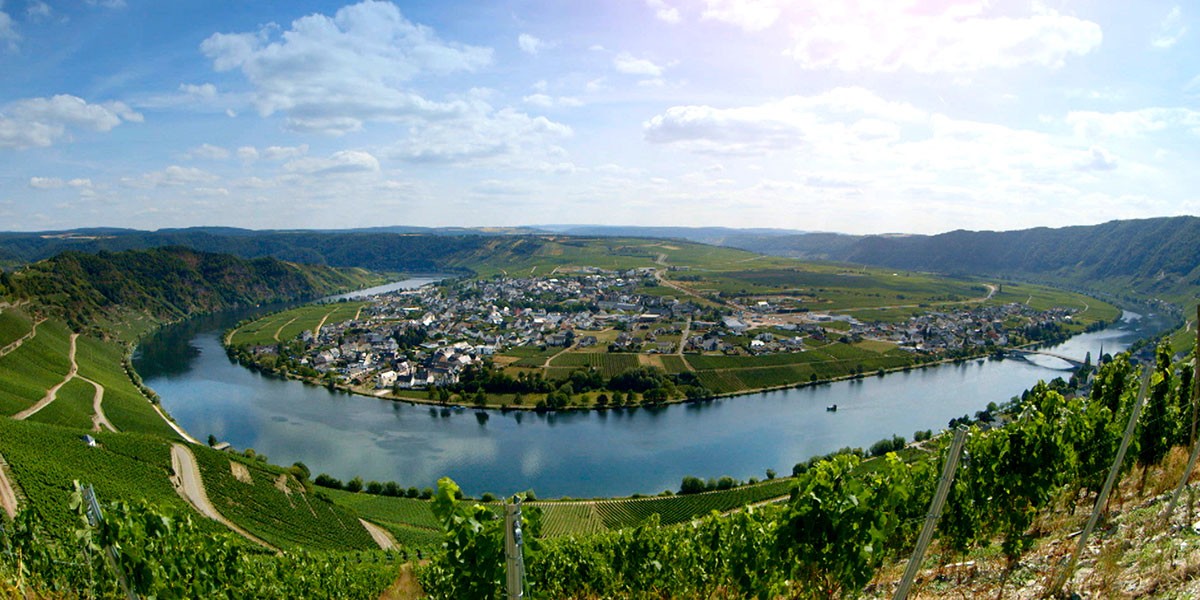 |
3sat, 10.40 a.m.
More than 1000 cellar alleys are among Lower Austria's defining cultural assets. In the past, grapes were pressed and wine stored there. Today, modern production facilities and warehouses have often taken over these tasks. The Kellergassen have become a tourist attraction: Small press houses, mostly huddled against vineyards, secluded squares, ascending alleys and simple Heurigen establishments. The longest cellar alley in Austria is in Hadres. Also worth seeing are the village-like ensemble of Unterstinkenbrunn and the "Galgenberg" of Wildendürnbach, which was voted the most beautiful Kellergasse in 2013. The "rediscovery" of the Kellergassen began in the 1980s with the first culinary events and the revival of "Going into the Grean" on Easter Monday. Picture file: Kellergassen.jpg
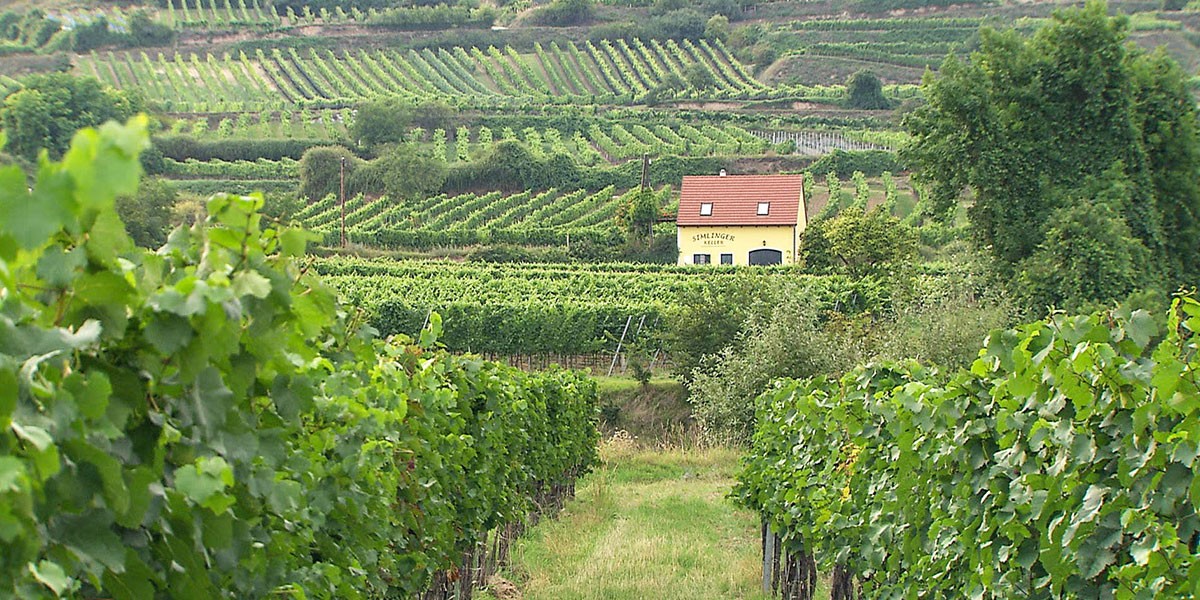 |
3sat, 4.45 pm
In western Styria the world-famous white Lipizzaner horses are bred and a unique wine made from the blue Wildbacher grape is cultivated, the Schilcher. Extensive alpine pastures, untouched river landscapes, lovely vineyards and winegrowers' houses: that is Western Styria. The soot of coal mining is history there. Today it is the Lipizzaner horses and the blue Wildbacher grape that characterise the land. Schilcher grows here, that unmistakable rosé wine made from the blue Wildbacher grape. It was the Styrian prince, Archduke Johann, who had these vines cultivated on a grand scale. Only in Schilcherland, from Ligist via Stainz to Eibiswald, does the grape variety find the best soils and the right climate.
SWR Television, 5.50 a.m.
3sat, 8.15 pm
On the slopes high above Lake Geneva, vines have been cultivated for generations. The wine terraces of Lavaux in the canton of Vaud with a view of the lake and the Alps are a UNESCO World Heritage Site. Winegrower Gilles Wannaz is aware of his responsibility and wants to protect Lake Geneva, the largest freshwater reservoir in Western Europe, from chemical pollution. Instead of artificial fertiliser, his vines are undermined with cow dung. Pesticides are not used. The winery is run biodynamically, i.e. close to nature and sustainable.
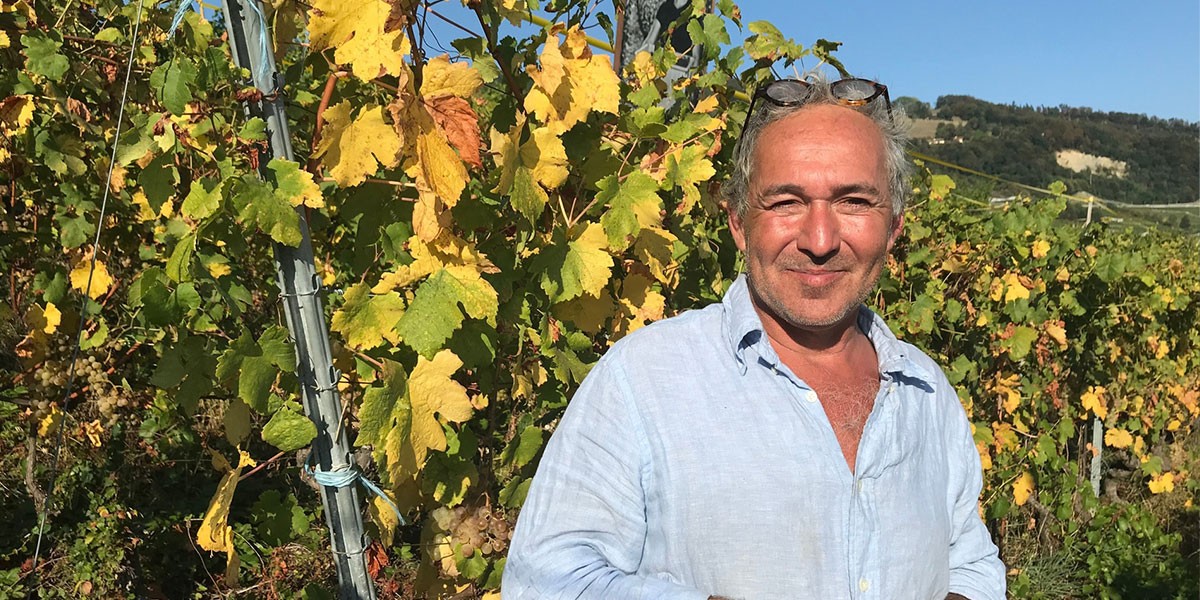 |
hr-fernsehen, 8.15 pm
The Rheingau and its wine have often been sung about - and filmed almost as often. But despite all the idylls and clichés, time has not stood still in this region either. Even in the beautiful Rheingau, residents - and especially the winegrowers - have to face new challenges. These include dealing with the clearly noticeable "climate change" as well as the search for modern forms of production and marketing. And of course, the Rheingau and its wine have also become a bit "multicultural" and globalised. The film observes how the wine develops in 2017 right up to the pressing stage, and accompanies the protagonists in their work. Image file: Rheingau.jpg
 |
ZDFinfo, 2.15 p.m.
Thieves harvest an entire vineyard overnight. Estimated loss: 15,000 euros. Professional gangs are also on the loose in orchards. Farmers and police hunt down the culprits.
arte, 3.50 p.m.
Russia's largest sparkling wine cellar is located in Abrau Durso on the Black Sea. Shampanskoye", the Russian version of champagne, is stored there in kilometre-long tunnels. The programme is also available online from 10/04 to 10/05 on the ARTE internet portal.
Das Erste (ARD), 4.10 p.m.
Today the winegrowers Fred and Christiane Emrich set out for Adendorf Castle with the staves of an old 600-litre oak barrel. Having been discarded as a barrel years ago, the wooden staves are nevertheless much too good to throw away. Now the task is to find the right expert. Picture file: Wine barrel.jpg
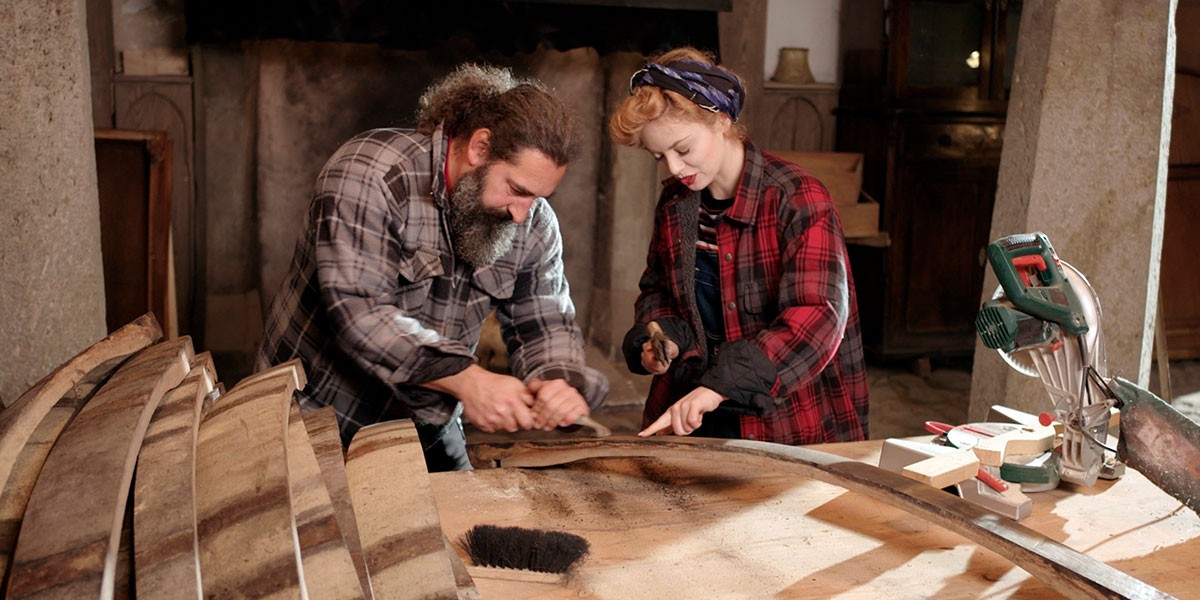 |
Bavarian Television, 2.15 p.m.
What would the Wachau be without apricots and wine? The dignified village of Weißenkirchen is virtually embedded in vineyards. It would be a sin to simply cycle past the numerous wine taverns.
SWR Television, 6.15 p.m.
Rheinhessen - the land of vines and turnips. As far as the eye can see, vineyards and fields dominate the landscape.
hr-fernsehen, 8.15 p.m.
Twenty kilometres north of Niagara Falls, where the Niagara River flows into Lake Ontario, lies the Niagara wine region with the small historic village of Niagara-on-the-Lake. There it seems as if time stands still. It is a region known for Canada's famous ice wine. The Iniskillin Winery in the province of Ontario has won many awards for its top wines.
arte, 19.30
An open-air opera festival is held once a year in Butuceni. Anatolie Botnaru, a viticultural engineer, lawyer and entrepreneur, set up the event. The 52-year-old has lived in the small town for 14 years. He has restored abandoned houses here in the traditional style and has been just as successful with international tourists as with his restaurant. Here, Olesea Cojocaru keeps the kitchen running with the help of the village women. They cook according to tried and tested recipes and press wine from old vines. And Grigore, after years abroad, has discovered a future for himself in his parents' vineyard. And by focusing on old grape varieties, he has found a niche for himself in the Moldovan winegrowing industry, which relies on mass production. The programme is also available online from 13/04 to 20/04 on the ARTE internet portal.
ANIXE, 4.25 p.m.
Falk-Willy Wild can see for himself during his trip that the Cypriot wines are of excellent quality. No wonder, because wine has been cultivated in Cyprus for thousands of years. An art that is also cultivated in the island's monasteries. The mountainous countryside with its idyllic little villages and ancient ruins on the coasts quickly make it clear that Cyprus is a destination for connoisseurs.
WORLD, 7.10 p.m.
Historic drink - where did the first wine come from and how is it made?
SWR Television, 6.15 p.m.
Whether sparkling wines made from meadow fruit or sparkling juices made from unripe apples, spiked with oak leaves - fruit farmer Jörg Geiger produces unusual drinks in his manufactory. These are now in demand in upscale restaurants all over Germany. His creations were born out of necessity and the desire to save old cultural assets. Schlat near Göppingen is Jörg Geiger's home, surrounded by many meadows with old scattered fruit trees. The apples and pears bear rare names like "Gewürzluiken" or "Karcher Pear" and are no longer suitable for consumption or sale these days. But Jörg Geiger appreciates the taste of these old varieties. He is particularly fond of one old pear variety, the Champagner Bratbirne. Like resourceful fruit growers in Schlat 150 years ago, he makes a special sparkling wine from it. In books from the 18th century, he discovered that these old varieties only develop their qualities if they are processed adequately. Instead of uprooting the pear trees that are supposedly useless today, he now even plants new ones.
rbb Television, 3.15 p.m.
In the mountains of the Swiss Jura, Antoine Générau begins a journey that will take him all the way to the south of France. A journey into the world of a mystical, once forbidden distillate: absinthe. He runs a trade in absinthe and is always on the lookout for new varieties. No spirit holds as many secrets and stories as absinthe. Absinthe is a strong alcohol flavoured with absinthe herb that is drunk diluted with water. At one time, half of France, including women, met at the "green hour" to pay homage to the "green fairy". The consumption of absinthe was libertarian and mysterious, and it was banned in 1915. It was replaced by pastis, which is now an indispensable part of southern France. But absinthe has other siblings: in the mountains of Chartreuse, silent monks of the Great Charterhouse have been distilling their green liqueur for 500 years. Only two monks know the recipe. The herbs for Génépi grow in the high Alps, and on the Mediterranean coast wines are refined with herbs and spices into a dry Vermouth. Antoine Générau, 30, is an absinthe dealer. He searches for new varieties - today absinthe is allowed again - and for original absinthe from the time before the ban, for so-called "old bottles" that can cost thousands of euros. The documentary accompanies him on a shopping tour from the Swiss Jura mountains across France to the Mediterranean. The camera team meets distillers and connoisseurs and delves into the history, culture and landscapes of a drink shrouded in mystery.
3sat, 3 .35 p.m.
The gold of today in New Zealand is wine, as winemaker Nick Mills tells us. Pinot Noir is the most famous grape variety of the southernmost of all vineyards, which has gained international recognition. Just as ships full of hopeful gold miners used to come to New Zealand, today they set off in the opposite direction, laden with wine.
hr-fernsehen, 6.00 p.m.
"A convent is a great talent shed. You discover things about yourself that you had no idea about before." This is what Sister Thekla says, who first learned the profession of winemaker at the St. Hildegard convent in Rüdesheim - because it was needed. The monastery includes extensive vineyards where grapes are harvested for the monastery's own white and red wine. Sister Thekla also walks through the vineyard with groups of visitors. Viticulture, like the monastery shop, the goldsmiths or the ceramics workshops, is a separate branch of the economy that finances monastic life in Rüdesheim.
hr-fernsehen, 7.10 am
When people think of "Hessian cuisine", the first things that come to mind are apple wine, green sauce and Handkäs' with music. But today's Hessian cuisine has much more to offer: Delicious meat dishes with apple wine, homemade herb soda or sheep's cheese made in Hesse.
Phoenix, 11.15 a.m.
Connoisseurs claim that Tuscany is at its most beautiful around Siena. Rich lords from England were the first foreigners to fall in love with the region and buy villas as local residences. Villa Cetinale is one of the finest examples. The family of Baron Francesco Ricasoli, on the other hand, has lived in the area since the Etruscans. At some point, the noble family began to cultivate wine, and it developed into one of the first great wine dynasties in the world.
WDR Television, 12.15 p.m.
Steep slopes and magnificent views, the Moselle is one of the most breathtaking rivers in Germany. But working on its banks has never been easy. Nevertheless, young people in particular are once again choosing to live along the Moselle - in France, Luxembourg and Germany. Rebecca Materne and Janina Schmitt belong to a new generation of winemakers who have rediscovered the steep slopes of the terraced Moselle. Rebecca Materne comes from the Ruhr area, Janina Schmitt from Hesse. In 2012, the friends leased a vineyard in Winningen near Koblenz - and grow Riesling on the slopes with an inclination of more than 50 degrees - without using machines, without pesticides. The couple's life is characterised by the unpredictability of the weather and hard work: tying the vines in spring, bottling in ssummer grape harvest in autumn. It would not be possible without the help of family and friends. If both want to make a living from winegrowing one day, their business has to grow. But Materne & Schmitt are optimistic. In Traben-Trarbach, the "Stadtschröter" drag a tree trunk through the town to set it up as a guild tree on the banks of the Moselle. Schröter were once indispensable for the wine trade. They heaved the filled barrels out of the cellars to load them onto ships. The advent of the wine pump caused the craft to die out.
MDR Television, 10.00 p.m.
One of the guests is Matthias Schuh, an organic winegrower from Coswig near Meißen.
ZDFneo, 6.35 a.m.
Why do we eat, what do we eat and how did it develop? Star chef Christian Rach goes on a journey through the cultural history of cooking and eating. For many centuries, wine was an indispensable part of a refined table. At Eberbach Monastery in the Rheingau, Christian Rach learns what it meant to pick the grapes by hand and press them in wooden presses. An effort that was gladly accepted. In the past, the consumption of wine and beer was higher than today due to the often poor quality of the water.
SWR Television, 8.15 a.m.
The winegrower Christoph Hammel from Kirchheim/Pfalz had to deal mainly with pests in the vineyard. Where today pheromone traps naturally deter the attackers, in the past people experimented liberally with poisons. Even arsenic, dusted with bellows, and E 605 were used.
WDR Television, 4.45 p.m.
Doreen Winkler came to New York with great ambitions. The 35-year-old from a small town in Saxony has become a sought-after sommelier in a short time. As a freelancer, she advises restaurants and private clients, hosts wine tastings and sits on competition juries. At a vegan dinner party in a 10-million city mansion in Soho, she does the wine service. Surprising guests who can afford everything with wines is her speciality. Can she pull it off with orange wine from Savoy and magnum rosés from the Loire?
Phoenix, 10.30 p.m.
Georgia, the land of longing for the Russians, is also called the "balcony of Europe" by its inhabitants. A country full of contradictions between Europe and Russia. Not only Russian poets raved about the Georgians' easygoing way of life. During Soviet times, legions of workers were allowed to holiday every year on the beaches of the Black Sea or hike in the magnificent vineyards. Russia has occupied a fifth of the territory since the 2008 Caucasus War, recognising the regions of South Ossetia and Abkhazia as independent states and installing puppet regimes. Since then, Georgia has aspired to Europe and hastily signed an agreement with the European Union on 27.6.2014. The country has pushed ahead with democratisation, even its architecture reflects this. Georgia is seeking proximity to the EU, its wine and fruit suppliers are aiming for the European market, and the country is also increasingly focusing on tourism.
hr-fernsehen, 9.50 a.m.
It looks anything but inviting at four o'clock in the morning: the Konstablerwache in the middle of Frankfurt. More than fifty farmers, vintners, gardeners, bakers, cheesemakers, fish farmers, beekeepers and butchers offer their specialities here, all of which they have produced in the Frankfurt area. This makes the Konstablerwachen market the largest farmers' market in Hesse and it is now impossible to imagine the heart of Frankfurt without it: it has long since become a popular meeting place for locals, commuters, tourists, pensioners, bankers, hipsters and pint lovers. "Erlebnis Hessen" visited the market, talked to producers and met some of them on their farms.
arte, 11.05 a.m.
Once a year it gets noisy in Butuceni. The village is located in eastern Moldova, between rocks and vineyards. In this godforsaken area, Anatolie Botnaru organises an open-air opera festival with international guests. Many Moldovans have left the country in search of a better life. Botnaru prefers to uncover the buried values of his homeland. Abandoned houses are converted into traditionally designed hostels, local food is prepared according to old recipes, wine is pressed in the village. This attracts tourists and has brought hope to the valley.
ANIXE, 11.45 p.m.
Following in the footsteps of the first settlers in the Barossa Valley, one comes across one of the best South Australian wines. The climate and the location right up to the southern ocean give the red wines their special flavour.
ANIXE, 16.25 hrs
Bella Italia! The northern Italian autonomous province of Trentino is an insider's tip for all those seeking the Italian way of life and relaxation in the mountains. Actor Falk-Willy Wild set out with a camera team to find out what, overall, makes the region so appealing. The journey also takes Falk-Willy Wild to where excellent red wines mature and fine grappa is produced. An informative, humorous travelogue about one of Italy's most beautiful holiday regions, garnished with a good dash of "Dolce Vita".
3sat, 1.30 p.m.
In impressive aerial shots, the film shows the uniqueness of the Neckar habitat: the rugged beauty of the upper course, where it seeks its winding bed between the Swabian Alb and the Black Forest, the middle course with its open valleys and vine-covered slopes, and finally the lower course, where its bed cuts deep into the Odenwald, the banks shaded by forests.
3sat, 3 .00 p.m.
Steep slopes and magnificent views: The Moselle is one of Germany's most breathtaking rivers. But working on its banks has never been easy. Nevertheless, young people in particular are once again choosing to live along the Moselle - in France, Luxembourg and Germany. Among them are Rebecca Materne and Janina Schmitt, who belong to a new generation of winegrowers. Rebecca Materne comes from the Ruhr area, Janina Schmitt from Hesse. In 2012, the friends leased a vineyard in Winningen near Koblenz. Since then, they have been growing Riesling on the steep slopes with a gradient of more than 50 degrees - without using machines or pesticides. The couple's life is characterised by the unpredictability of the weather and hard work: tying the vines in spring, bottling in ssummer grape harvest in autumn. It would not be possible without the help of family and friends. If both want to make a living from winegrowing one day, their business has to grow. But "Materne & Schmitt" are optimistic about that. Picture file: Moselle.jpg
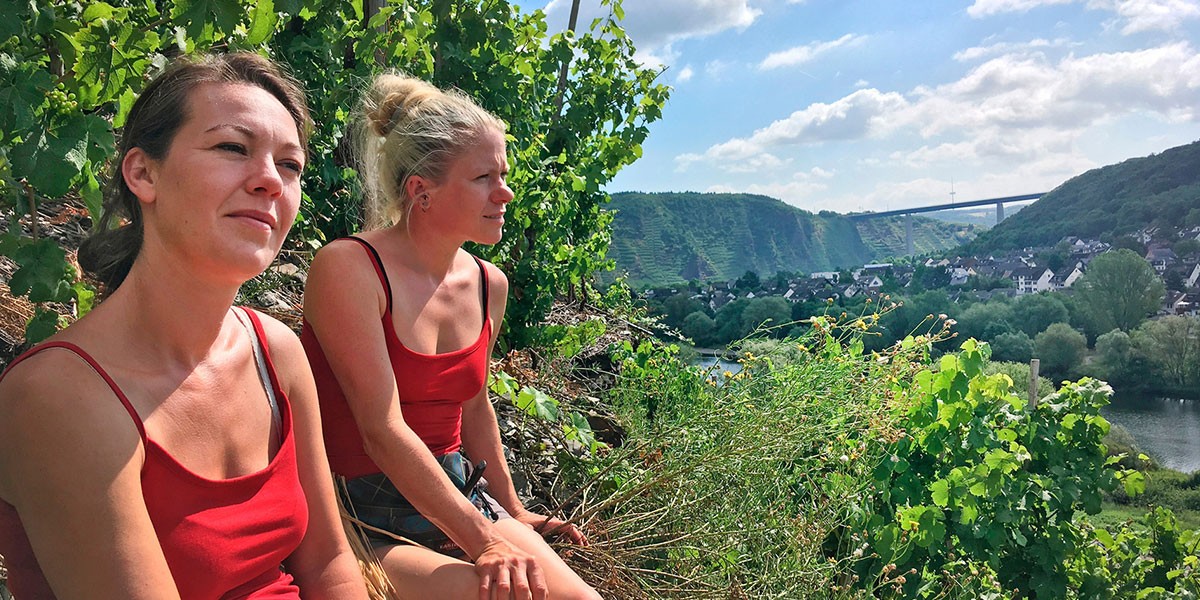 |
3sat, 11.40 a.m.
Garden specialist Karl Ploberger takes viewers on a unique journey to the Cape Province in South Africa. The country is especially known for its unique flora. Ploberger visits the famous botanical garden "Kirstenbosch", two wine estates, a social project, a vegetable and fruit plantation as well as the historical garden monument "Old Nectar". A varied excursion through the South African flora. There is no getting around wine in South Africa. Some of the wine estates also have magnificent, lushly flowering gardens. Ploberger pays a visit to the "Vergelegen" and "Rustenberg" wine estates.
ANIXE, 8.15 pm
We accompany a winegrower from Sicily to the wild Nebrodi mountains. There he meets a farmer from the region whose historic vineyard has been spared from the phylloxera plague. For this reason, he still has indigenous grape varieties that were on the verge of extinction. It will be shown how they were found and saved, how their DNA was analysed and how they are now being preserved and re-bred. The region of Sicily is at the forefront when it comes to the conservation and production of old wine varieties. To this end, it is developing innovative and experimental plant clusters and colonies.